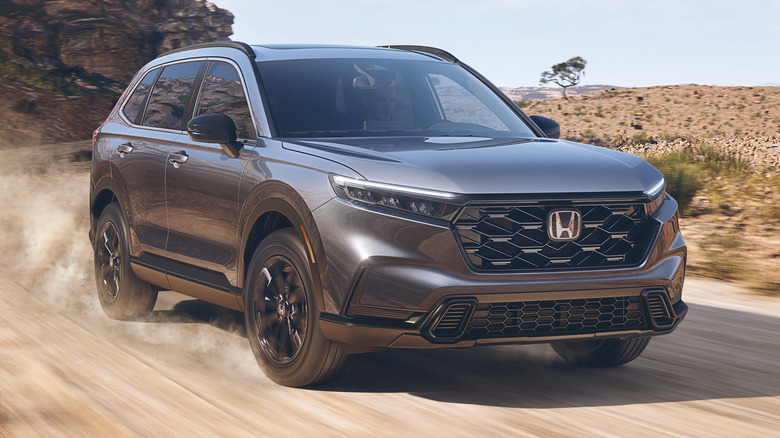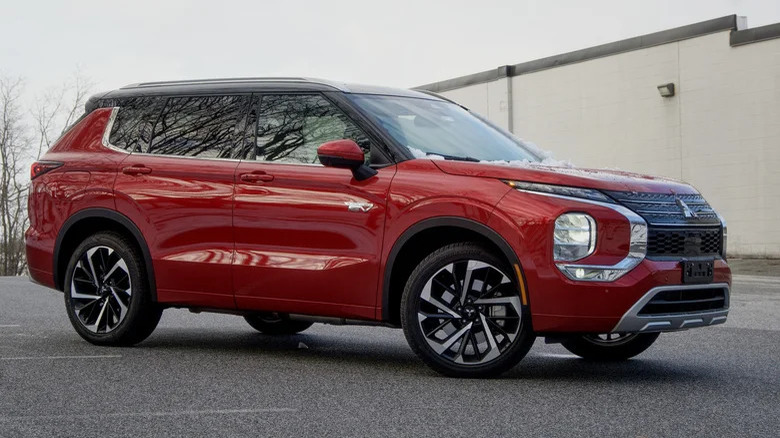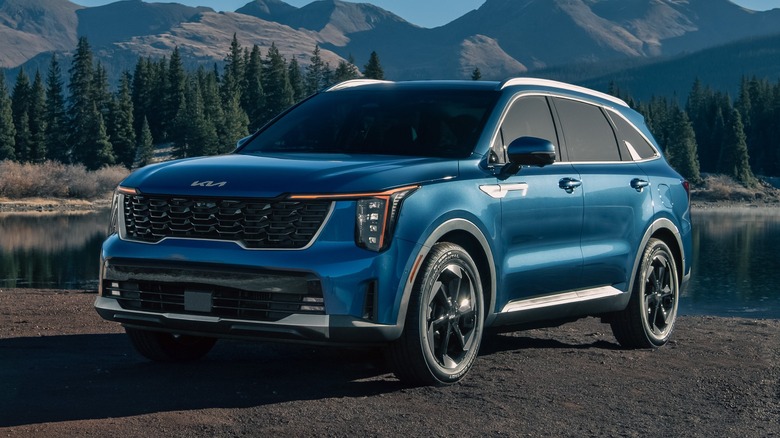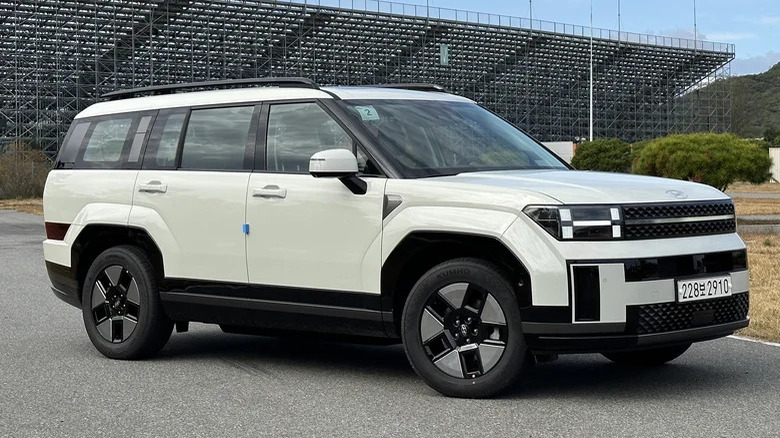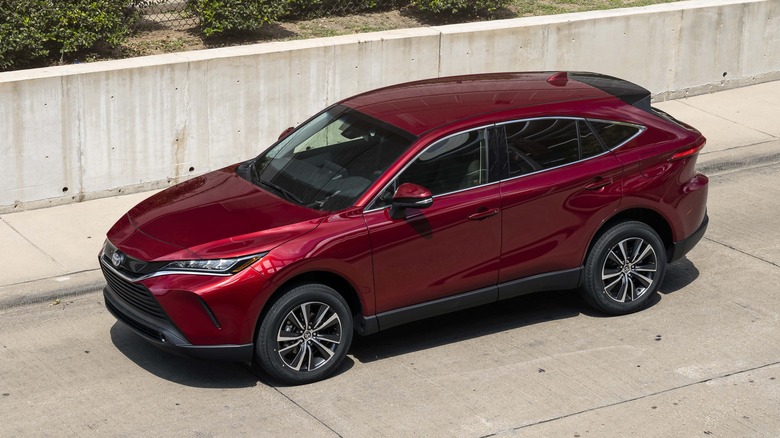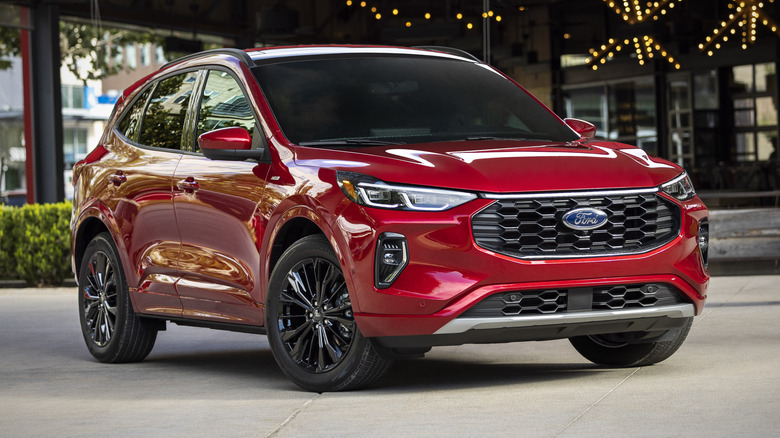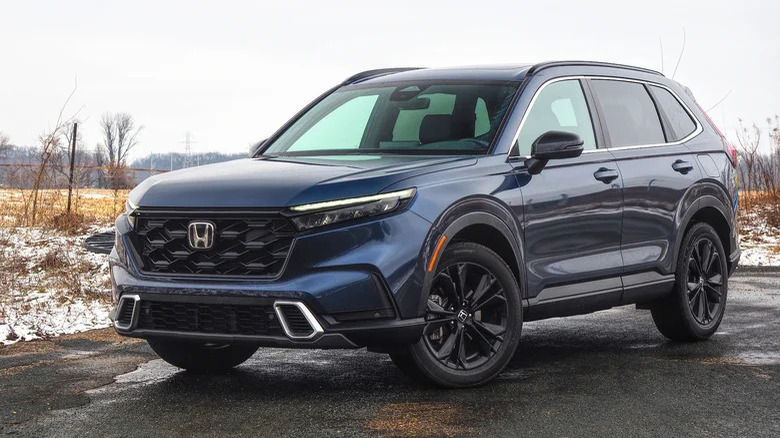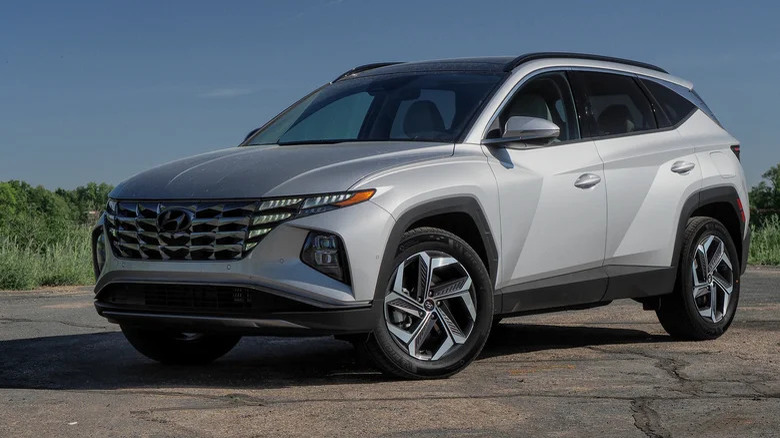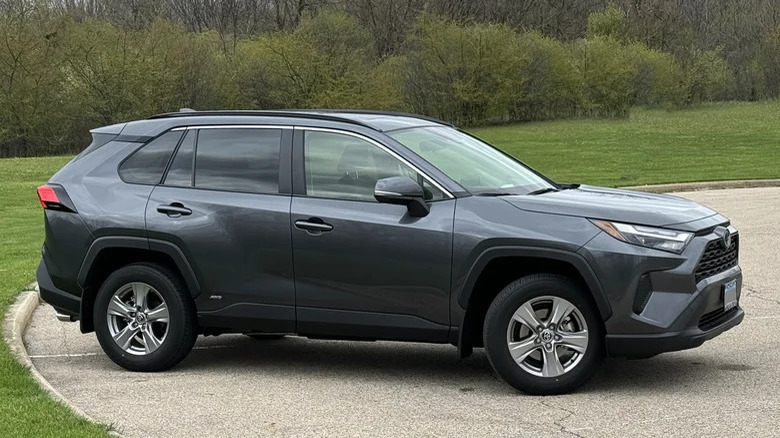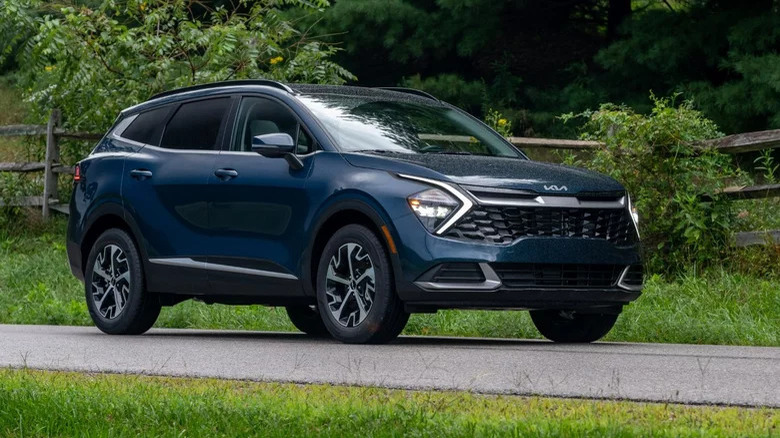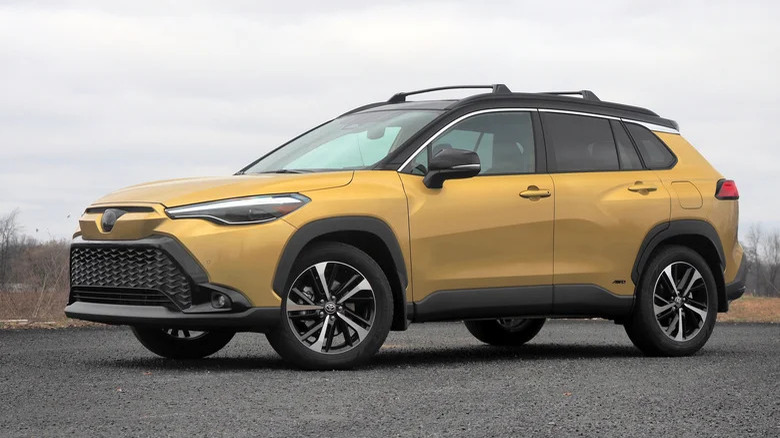The 10 Cheapest Hybrid SUVs In The US For 2024
Despite their green credentials, the current practicality constraints of driving an all-electric car is enough to put off a large proportion of buyers. However, you don't have to miss out on the benefits of electrification altogether. Buying a hybrid vehicle offers a middle ground, offering the freedom to cut down on gas usage — or in some cases, zip around town on pure electric power — without the need to rely on the often patchy EV charging network.
With SUVs and crossovers continuing to be one of the most in-demand market trends, it's no surprise that many manufacturers have focused their efforts on equipping their SUVs with a wide range of powertrains, including hybrids. Most involve paying a small premium over their gas-powered counterparts, although that premium doesn't have to be a dealbreaker.
In fact, there are plenty of hybrid SUVs out there for prices just as attractive as traditional gas-powered models. We've rounded up the 10 cheapest on sale right now, with each quoted price including the compulsory fees that many manufacturers sneak in on top of their MSRPs.
Mitsubishi Outlander PHEV – $41,840
It's easy to overlook the 2024 Mitsubishi Outlander PHEV, despite the fact that it's one of the cheapest hybrid SUVs in the country. Mitsubishi's brand presence has been somewhat diminished in recent years, and the Outlander PHEV doesn't really do much to excite. It's a seven-seat, plug-in hybrid that borrows from Nissan's parts bin, and ticks all the right boxes for a family hauler without being excellent at any individual thing. However, that doesn't mean it should be dismissed.
Our reviewer was impressed with the SUV's hybrid 2.4-liter four-cylinder powertrain, noting that it always remained quiet during everyday driving. The well-equipped, leather-finished interior in our tester also scored highly, although base-spec models won't be quite so plush. With compulsory fees accounted for, the base-spec Outlander PHEV starts at $41,840 for 2024, making it one of the cheapest hybrid seven-seater cars on the market. It's a solid all-rounder that might well prove to be exactly what buyers with larger families are looking for. That is, if they remember it exists.
Kia Sorento Hybrid – $40,065
The Kia Sorento saw a major refresh for the 2024 model year, with the Sorento Hybrid model launching a year later for 2025. The most immediately noticeable change is the new exterior styling, which might not be to everyone's tastes, but there are plenty of changes made to the interior too. Most of those changes center around the introduction of Kia's latest technology suite, with the infotainment running a new operating system and over-the-air updates now available for some models.
While plenty of new features have been added to the 2025 Sorento Hybrid, those additions haven't resulted in any significant price increases. In base-spec form, the 1.6-liter four-cylinder hybrid costs $40,065, although be liberal with the options list and that price can increase to over $54,000. The Sorento Hybrid is arguably the best value for money in the lower portion of its trim range, where it offers a compelling mix of space, technology, and hybrid efficiency in the increasingly crowded midsize SUV segment.
Hyundai Santa Fe Hybrid – $38,345
With its distinctive, boxy new look for the 2025 model year, the three-row Hyundai Santa Fe Hybrid doesn't look much like a typical midsize SUV. However, despite its polarizing appearance, underneath it's more of the same from Hyundai. That's no bad thing: the outgoing Santa Fe was already a highly impressive car, and so there was no need to mess with the core formula. Just like before, the SUV is big on space, big on equipment, and big on value for money, with the cheapest hybrid variant available from $38,345.
While still images make the new Santa Fe look significantly larger than the previous generation, its footprint hasn't changed significantly. It's grown less than 2 inches in length and height, and is no wider than before. That added length results in improved legroom for rear passengers, although the third row is still not truly adult size. The car's 1.6-liter four-cylinder hybrid powertrain won't win any awards for speed, but it's adequate across both highway and urban driving. It's one of the few compromises that buyers of the lower-spec Santa Fe Hybrid will have to make, as it's otherwise well equipped and impressively comfortable for the money.
Toyota Venza – $36,465
Buying a base-spec hybrid SUV can quite often mean forgoing all-wheel drive, but not in the case of the Toyota Venza. Even the cheapest variants get power sent to all four wheels as standard thanks to Toyota's Electronic On-Demand All-Wheel Drive system. The 2.5-liter four-cylinder engine and two electric motors drive the front wheels, while a separate electric motor powers the rear wheels. Depending on the situation, the system can distribute up to 80% of power to the rear wheels, while during everyday highway driving, the Venza operates effectively as a front-wheel drive car.
The Venza is based on Toyota's TNGA-K platform and shares both mechanical and interior parts with other SUVs in the brand's range. It's most closely related to the RAV4 Hybrid, but the Venza is both slightly more expensive and not any roomier than its stablemate. In essence, Venza buyers pay a small premium over the RAV4 Hybrid for the Venza's swooping styling and little else. For 2024, the Venza starts at $36,465 including fees.
Ford Escape ST-Line Hybrid – $35,630
The Ford Escape Hybrid serves as the Blue Oval's sole hybrid SUV, with its other electrified options being all-electric. Ostensibly, it does what it sets out to, giving buyers of the Escape a more fuel-sipping alternative to the gas-only variants while keeping prices within the realm of what said buyers expect. The cheapest option for 2024 is the Escape ST-Line Hybrid, which retails for $35,630.
It packs the same electrically-assisted 2.5-liter four-cylinder powertrain from previous model years, but thanks to new testing regulations, it's down a few horsepower, at least on paper. However, it's not all bad news: the car's suite of tech features has been given a freshen up for the latest generation, with minor styling tweaks across the front end to boot. The Ford is sold in a very competitive segment, with popular offerings from the likes of Honda, Toyota, and Hyundai all available within a few thousand dollars of the Escape's starting price. However, it holds its own as a solid option for buyers who don't want to go down the Japanese or South Korean car route.
Honda CR-V Hybrid – $34,350
It's not difficult to see why the Honda CR-V Hybrid crossover remains a bestseller year after year. The CR-V offers a winning combination of practicality, technology, and fuel-sipping efficiency, all wrapped up in a body shell that's far less polarizing than many rival SUVs. It's affordable too, with the cheapest 2024 CR-V Hybrid available for $34,350 including fees. The CR-V Hybrid's sole powertrain option is a 2.0-liter four-cylinder engine complimented by two electric motors, one of which acts as a power generator and the other to boost traction.
Inside, the cabin is both roomy and generously equipped across all trims, with the 7-inch standard infotainment touchscreen and 7-inch driver display being less intrusive than some rivals. There are still plenty of physical buttons and switches as well as the touchscreen, which makes finding most of the controls while driving an intuitive process. Honda's safety tech has also been improved on the latest generation, although not always perfectly. Our time with the car was punctuated by intermittent false warning signals from Honda's lane assist feature, which would often get confused when lane markings were less than perfect on the road. Other than that, we had few complaints about this latest iteration of the popular SUV.
Hyundai Tucson Hybrid – $33,950
Much like the Honda CR-V, the Hyundai Tucson Hybrid offers electrification without headaches. It's a few hundred dollars cheaper than the CR-V, with the most affordable variant starting at $33,950 for 2024. Its 1.6-liter four-cylinder engine and single electric motor is shared with other similarly priced products in the Hyundai/Kia stable, and much like those stablemates, it's reasonably powerful but never excitingly so.
Unsurprisingly, it's the car's practicality rather than its driving fun that takes center stage with the Tucson Hybrid. The cabin is spacious, thoughtfully designed, and generally easy to warm to, although our reviewer found the lack of physical buttons to be an inconvenience. The level of standard equipment across all trims is very competitive, although that will be no surprise to existing Hyundai SUV owners. The Tucson Hybrid's electrification is of the mild variety, which means buyers might not notice it all that much in everyday driving. That is, until it's time to fill up: The EPA says that the hybrid will manage close to 150 miles more than the gas-only Tucson on a single tank.
Toyota RAV4 Hybrid – $33,075
The Toyota RAV4 remains one of the brand's most popular models, in no small part thanks to its affordable asking price. The cheapest configuration available for the 2024 RAV4 Hybrid clocks in at $33,075, making it one of the very cheapest cars of its size on the market. Its combination of value for money and practicality recently persuaded SlashGear's Adam Doud to buy one for himself, although the inclusion of some extra options pushed that car closer to $40,000. Even at that price, the verdict was the same: The RAV4 Hybrid is plenty of car for the cash.
Impressive gas mileage is, to no-one's surprise, one of the car's biggest selling points, with the 2.5-liter four-cylinder hybrid powertrain delivering real-world performance that largely matches its EPA figures. Meanwhile, the car's ergonomic infotainment system and plentiful safety tech also strengthen its appeal. While there are roomier SUVs to be found in the pricier realms of Toyota's lineup, the RAV4 Hybrid can accommodate adults across both rows as well as a weekend's worth of luggage without complaint. Few cars offer such a complete package for the price, and even fewer can back it up with Toyota's famed reliability.
Kia Sportage Hybrid – $29,965
Available for a few thousand dollars cheaper than the Toyota RAV4 Hybrid, the Kia Sportage Hybrid will go the distance for a similar crowd. You can buy it for as little as $29,965 for 2024, making it one of just two hybrid SUVs available for less than $30,000. Given the budget-oriented price, the Sportage Hybrid features plenty of standard tech, as well as delivering the strong fuel economy that the hybrid moniker promises. The Sportage Hybrid's interior is a generally plain but inoffensive affair, with the faux leather upholstery in our test vehicle feeling suitably durable for a family hauling vehicle.
During our time with the car, our reviewer did notice one odd and potentially annoying peculiarity: At 70 mph, the car would switch between gas and electric power seemingly for no reason. At higher and lower speeds, the issue went away, but in states where the speed limit prohibits significantly faster cruising speeds, it might well become jarring after a while. However, in all other aspects the Kia delivered on its family-friendly brief, and for the price, many buyers might be willing to overlook its foibles.
Toyota Corolla Cross Hybrid – $29,570
Combining the platform of the Corolla with the 2.0-liter four-cylinder hybrid powertrain from the Toyota Prius, the Toyota Corolla Cross Hybrid is the most affordable hybrid SUV on the market. It's available for as little as $29,570 including fees, but there are some compromises buyers will have to accept as a result. The first is room: The stereotype is that crossovers and SUVs are roomier than their traditional passenger car counterparts, but that's not the case with the Corolla Cross Hybrid. Our reviewer found the car noisier than other hybrids too, sometimes gratingly so.
In addition, it feels cheaper inside than many of the other affordably priced hybrid SUVs here, although in fairness, that is to be expected given that it is over $10,000 cheaper than the tenth place entry in the list. Toyota's design is not particularly noteworthy, placed firmly into generic territory, but at least it's not ugly. That's a shame, especially given how much Toyota has improved the looks of the latest Prius. The compromises are clear, but with all-wheel drive, Toyota reliability, and mini SUV styling for under $30,000, it's still a solid option for buyers who don't want to — or can't — venture further up Toyota's SUV lineup.
